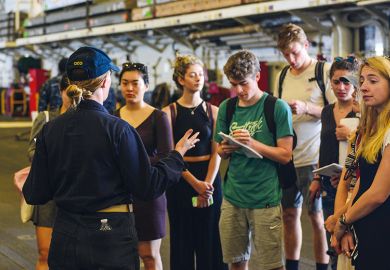Most of us in international education are zealots. Having experienced the transformation of being born again in a new country and culture, we become evangelical about providing that transformational opportunity to others.
Our zeal, however, hides some important empirical proof points. The emerging data show – even when self-selection and social economic indicators are considered – that learning abroad delivers better core academic outcomes.
This is a critical insight. A side effect of massification has been decreased retention rates and questions around standards that have increased the focus on graduate outcomes and employability. Put differently, we’ve had great success getting more people into university – which is critical to a knowledge-based economy – but have left too many with the financial and psychological burden of dropping out.
The nascent research suggests that students who go abroad as part of their degrees get better grades and are more likely to graduate. Study abroad increases motivation to complete degrees and helps young people find their career direction.
A study by the Consortium for Analysis of Student Success through International Education has established, in particular, that learning abroad can provide a boost to the academic outcomes of “at-risk” student groups. When comparing like-for-like students, the consortium, funded by the US Department of Education, found that students who study abroad have a 10 per cent higher likelihood of graduating and that they do so faster than their peers.
Other studies show that learning abroad is associated with cognitive development. That is, those learning abroad get smarter than those who aren’t, with a higher impact on those who have had limited prior travel experience. Importantly from a public policy sense, the research also supports a focus on short-term mobility programmes because the students most likely to benefit are those who cannot take advantage of longer-term programmes.
Interestingly, earlier US research from the GLOSSARI study suggests a “sweet spot” in terms of return on investment, of roughly four to eight weeks abroad. For governments and institutions, this helps inform the balance between longer programmes that provide depth for fewer individual students and shorter programmes that are more accessible to more individuals.
It suggests that initiatives like Australia’s New Colombo Plan, and Asia Bound before it, should be broadened and deepened. And sleeper programmes such as OS-HELP, which provides student loans to those seeking learning abroad as part of their degrees, should be revitalised. Similarly, it supports broad-based programmes like the US’s 100,000-strong initiative in China and the UK’s three-week Study China Programme.
Admittedly, the research findings come from the US; the differences in system and context between the US and Australia mean that we need to understand more about the experience of our own students following learning abroad programmes.
But we already know enough to suggest that we need to adjust our government and institutional policies to increase our commitment to studying overseas as part of degrees. Universities with the lowest participation rates and highest non-traditional student populations have the most to gain.
For institutions, the research suggests that rather than channelling inbound international student fees to build larger lecture theatres or to pay for more research to buoy the rankings upon which recruitment relies, perhaps these cross-subsidies would be better deployed to lessen the financial obstacles that prevent domestic students from taking up the international opportunity.
Ensuring that students understand the programmes and funding available, and the value of the experience, can nudge them to lodge applications. And this strategy also suggests – as some universities have already done – moving study-abroad offices from the outskirts of the international portfolio to the centre of the student experience.
Yup, that’s right. Because it turns out that the fringe fanatics in the international student mobility office are addressing higher education’s headline issues and delivering its core metrics. While academic leaders pin their hopes on work-integrated learning and using machine learning to identify “at-risk” students, the secret sauce might simply involve ensuring that more students have passports.
Kent Anderson is acting deputy vice chancellor at the University of Newcastle, Australia, and a member of Australia’s Ministerial Council for International Education. Davina Potts is associate director of global leadership and employability at the University of Melbourne.
Register to continue
Why register?
- Registration is free and only takes a moment
- Once registered, you can read 3 articles a month
- Sign up for our newsletter
Subscribe
Or subscribe for unlimited access to:
- Unlimited access to news, views, insights & reviews
- Digital editions
- Digital access to THE’s university and college rankings analysis
Already registered or a current subscriber?








